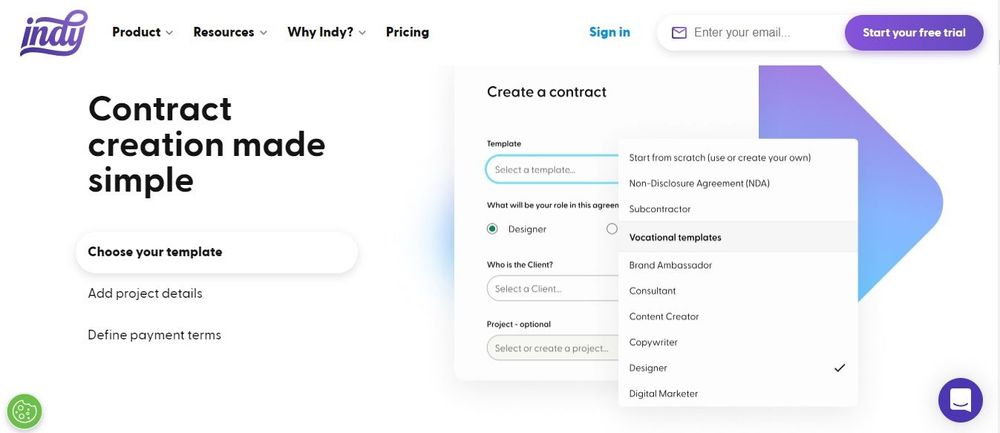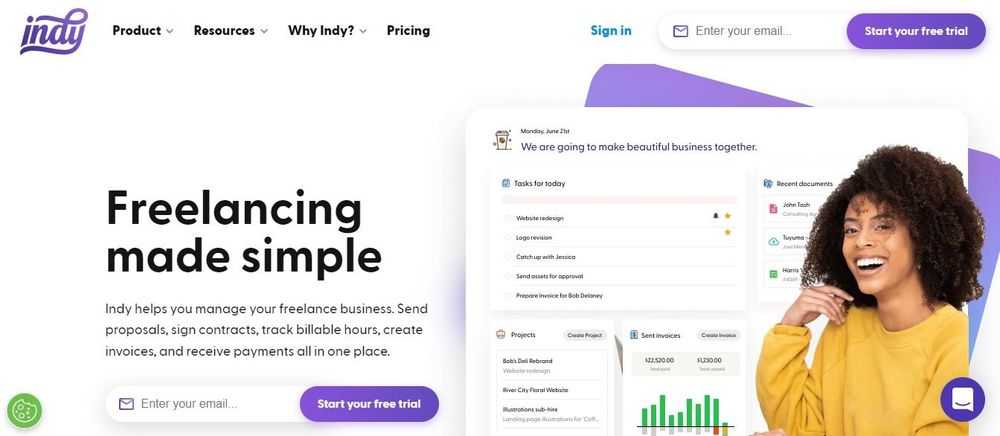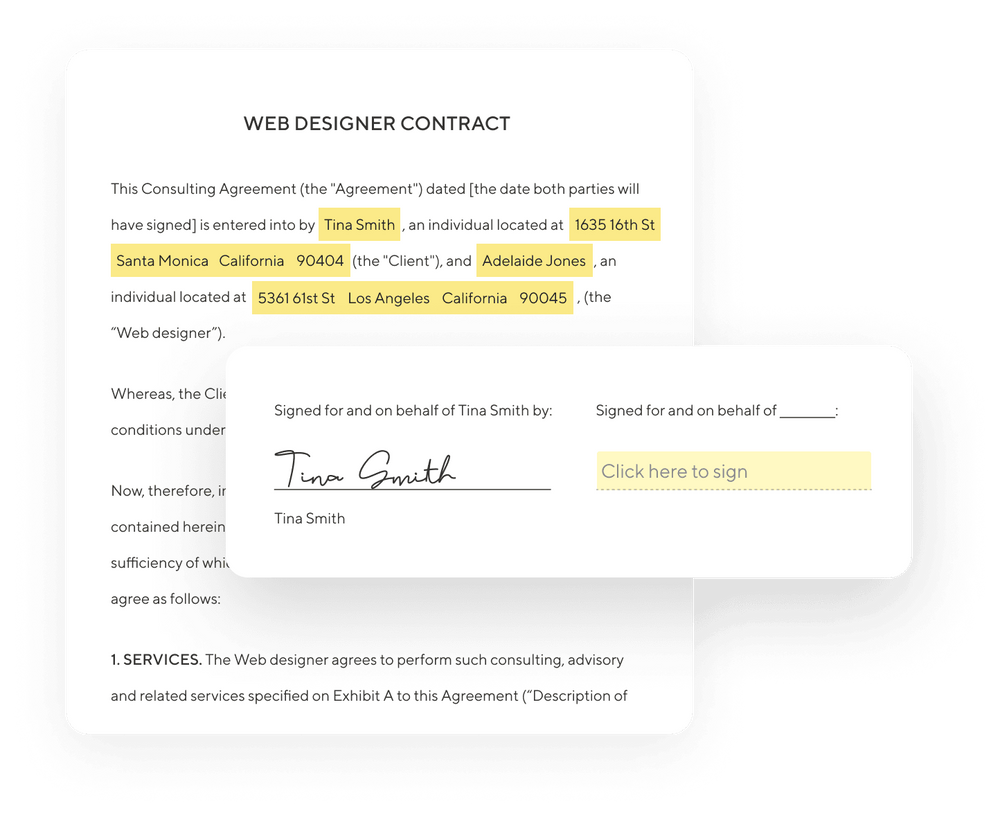Sadly, some freelancers and independent contractors face the nightmare of unpaid invoices, work disputes, and poor customer relationships because of misunderstandings.
The best way to avoid project and pay disputes is by clarifying the details with a contract before the project begins.
Using automatic contract management can save up to 50% of your costs. Here is a list of 11 steps that a business owner can take to create a contract for transactions, including:
- Deal directly with company decision-makers
- Create a written contract
- Be clear on payment terms and methods.
Let’s get into more detail now about how to write a contract.
Why is a legally binding contract important?
Case studies have shown that when making a vital business transaction, a legally binding contract is essential to success, as it clearly lays out everything that is needed so all the parties agree to what is expected and the cost structure is above the line.
Having a written contract makes the transaction fully legally valid and minimizes delays by clearly putting down instructions and responsibilities.
It also helps a small business in the unfortunate event that a dispute or arbitration is needed, as the owner can quickly point to where a violation occurred in the transaction.

When to use a written contract
Written contracts are appropriate for all types of circumstances, but especially when a sales item is involved. It is also used for employment services or for artistic pursuits with a commercial purpose. You will always want to prefer a written agreement over a verbal one, and by law, certain types of contracts must be written, including sales of projects one year in length.
For a freelancer having a written contract can make or break a project. It protects their work and offers a transparent process between the client and the freelancer.
11 steps to writing a contract
Here is a list of tasks to follow when you want to write a contract. There are a few key points to know when initiating a contract: they must be formed and accepted; they must have an executable aspect by one or more parties involved; they must also have a mechanism for enforcement.
Good contract management starts with information discovery
In this first step, you need to learn as much as you can about the customer, their objectives, how they want the work to be carried out, and their deadlines.
What you need to learn:
- Start with basic contact information
- Project objectives
- Deadlines
- Specific deliverables desired
- Any concerns the customer has
For freelancers:
- Prepare information about what your roles will be. You can use our tools here on Indy to help
- Estimate the work amount in hours and money
- Consider your risks and how they can be mitigated
Data collection involves gathering all pertinent evidence associated with the parties, targeting that information for processing and identification of relevant data, and processing for document hosting and legal document/information review.
The benefit of doing due diligence with a potential partner cannot be overstated, and it can clarify your own business needs when negotiating.
Think about it as protecting yourself and knowing what to ask for and how the other company may respond during negotiations.
Deal with the decision-makers directly
Make sure that when the two parties start the contract process that both are fairly represented by company decision-makers. It wastes everyone's time if one or both have to go back to their bosses and kick ideas up and down the chain; rather, it is better that everyone is fully empowered.
It takes a little time to prepare for this step, but it is worth it to save time in the negotiation process. If you are starting the process, go ahead and politely affirm your intention to reach out to the right person.
For freelancers, it depends on where you are starting the contract. For an agency, it might be the point of contact which recruited you. If you are reaching out, try someone higher in the HR or sales departments to ensure that the contract is effective. You can find this information on a company website or on repositories such as LinkedIn.
Name all parties involved correctly
To make a contract enforceable, it is completely necessary to identify all the entities correctly, as benign as that sounds.
Doing so prevents unnecessary opportunities for delays and makes sure that the contract is enforceable.
You need the correct legal names of the parties, including suffixes.
Make sure the owners and signatories are all mentioned.
Make it a written contract
Gone are the days when firm handshakes and verbal agreements can seal a deal; there are too many examples of negotiations falling apart due to unclear information or one party acting dishonestly.
A written contract is, therefore, one of the essential elements of a successful transaction. It clearly outlines the legal rights of both parties and makes everything more transparent.
Through tradition and legality, both electronic documents and E-signatures are completely valid for business today.

Writing a business contract for the first time?
If you are writing your first contract, then try not to worry too much. If using the services of a licensed attorney is not practical, there are plenty of free and affordable resources out there to help you put everything in plain language. Consider using contract templates to make one quickly. Indy offers many tools to help you save time and money as a first-timer when creating contracts.
Make sure that the essential elements are included: full legal names, the rights and obligations, and the payment details.
Make the written agreement as simple as possible
This step is one that applies in everyday business operations, not just when it comes to a legally binding agreement. Avoid clutter in the contract by avoiding unneeded fluff and terminology and just keep the information there on a basic level.
Avoid technical jargon and just stick to the list of facts and responsibilities for both parties. This cuts down on preparation time, too.
Having a contract management system can simplify the workload for you as you write it out.
Clarify the payment terms
It is necessary to specify the payment terms to create a legal description of the transaction and to make sure all the parties understand the contract terms. You may want to specify how the payment can be transferred upon successful completion.
There is also the option of providing incentives for early project completion in the contract lifecycle.
This is especially important when it comes to freelance workers. Having this information spelled out prevents opportunities for payment delays or losing out on their funds. They can request to be paid during milestones, on a schedule, or in full upon delivery.
Agree on dispute resolution terms
This step should not be forgotten; if a dispute arises, there needs to be a way to provide legal action. These items can be as simple as official recognition of contract separation and refunds, all the way up to third-party arbitration services.
Having a clause on handling disputes can result in an amicable solution. Or it can spell out methods to modify the terms rather than resort to dispute resolution.
For example, you can make a note that any controversy or alternate interpretation be handled by written arbitration within a set time frame.
This is one of the most important items to put into the contract so both you and the other party know how to proceed if there is a problem.
Choose the jurisdiction for the contract law
Business contracts that exist today have a long history of legal precedent stemming from civil and state and federal laws. If there needs to be dispute resolution between you and the other party, you need to know the venue to file the suit: where the correct jurisdiction lay. This is always where ownership is declared, as the filing cannot just be done anywhere.
Different Courts also have rules about monetary amounts and where those are filed.
For freelancers who live in a different state than where their client is, they will generally want to make a note that they are governed by the laws of the state they inhabit. That ensures they have access to local counsel.
Another important point is that if one entity is unable to legally consent to a contract, it will make a contract invalid. This is for cases of undue influence or false statements.
Choose the ending date and termination clauses
A critical part of legal agreements includes specifying the length of a contract, including the ending date and clauses for any methods of termination apart from successful completion, including in the case of so-called Default Events.
If a project will be broken down into multiple chunks, the due dates will need to be spelled out as well before closing it out.
A freelancer should pay close attention to these clauses, as there may be times when they want to break it early due to client incompatibility or reasons they cannot finish a project. This gives them an avenue to do so professionally.
Consider a non-disclosure agreement or confidentiality clause
For sales contracts or employment contract documents it will be good for one party or both to add a non-disclosure agreement (NDA) or a confidentiality clause to protect themselves and maintain competitive edges.
They exist to protect business secrets, for example, patents, documents, and other corporate data that should not be public knowledge.
Freelancers may be required to sign a confidentiality agreement for projects that involve creating a new service. They can refuse to work with a client that requires one, for two reasons. They may see a lack of trust on the part of the client, or it prevents them from adding to their portfolio.
A similar clause involves non-competing; employees and companies could be compelled to avoid working with a competitor to the other party for a set period of time. This also has the advantage of preventing another party from poaching a client.

Define who owns any intellectual property rights
This step applies more for making a unilateral contract agreement where a service or idea is generated, rather than selling a physical project. You will want to specify whether you or the creator will own the final intellectual property (IP) rights so as to avoid any issues down the line.
IPs allow for the creator to benefit from the good or service, so its importance in contracts should not be overlooked. For example, a photographer may want to confirm the copyright of any of their images, even if it is a work-for-hire project.
Freelance creators have the option to add a copyright, unless the contract assigns the right to the pieces to the buyer to license and use.
When it comes to instances where royalties may be paid to a freelancer, it will be explained in the contract so the third party may make use of the work while still paying fair compensation.
Although a client cannot take ownership of works done outside of the project, contracts can be set up to assign all ownership of the project to the client.
If you need assistance with that part, you may want to involve legal professionals.
Make the signing process simple
Consider using contract management software to finish this. There are now ways to electronically sign documents, as long as they are accepted by the two or more parties. The signing is what really is the reason for you to write a contract.
A few key points to keep in mind is that it goes back to having the decision-makers together in order to streamline the signing. Indy offers Contracts tools that simplify the signing process as it tracks signatures automatically.
What about verbal contracts?
Although verbal contracts were the dominant process throughout history, the business landscape works against such a system now. The importance of valid contract law means that parties have a considerable incentive to write everything down rather than rely on oral contracts to make business relationships, as it is difficult to enforce a verbal contract without proof that the details were agreed upon.
What defines a verbal contract?
Strictly speaking, a verbal agreement is identical to a regular written document. They are created when the involved parties make an offer, accept the offer, and make consideration, that is, give up something in exchange. It is those factors that make the contract a formal one, so that there is a transfer of money or services.
When are oral agreements legally binding?
Verbal agreements become legally binding when the above-listed three actions happen, and parties both have the mental capacity and intention to create the contract. Under certain jurisdictions, the laws state that an oral agreement also cannot modify a written contract.
Is a verbal agreement a legal contract?
An oral agreement is still legally binding as long as all the parts are present and it does not violate the Statute of Frauds, which is a concept dating back to the days of common law societies of the middle ages. It affirms that certain types of contracts must be actually written, namely sales of land, agreements involving goods worth over $500, and contracts lasting one year or more. For freelance projects, that means they will usually need to be on a written basis.
Wrap up

We have gone over the steps on how to write a contract and make a successful transaction for your business. If you have further questions, reach out to our team here on Indy for assistance or read another one of our articles on related subjects, or use one of our tool sets to get your contract started. With Indy, you’ll get access to productivity tools like proposals, contracts, forms, task management, scheduling, invoices, and time tracking to help manage projects from beginning to end. Indy makes freelancing simple, and you can get started today for free!



